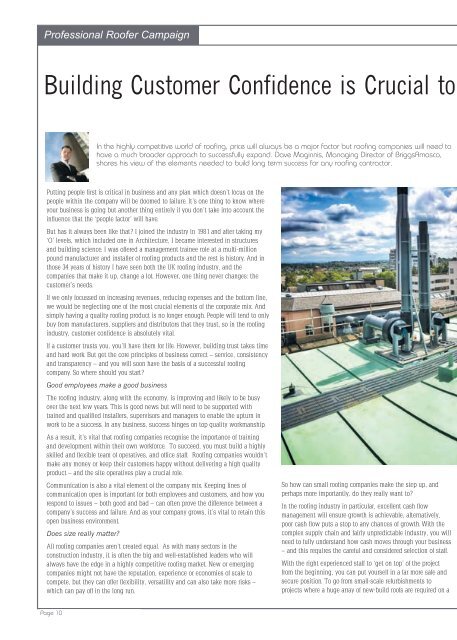Roofing
1ju0hIR
1ju0hIR
Create successful ePaper yourself
Turn your PDF publications into a flip-book with our unique Google optimized e-Paper software.
Professional Roofer Campaign<br />
Building Customer Confidence is Crucial to Success<br />
In the highly competitive world of roofing, price will always be a major factor but roofing companies will need to<br />
have a much broader approach to successfully expand. Dave Maginnis, Managing Director of BriggsAmasco,<br />
shares his view of the elements needed to build long term success for any roofing contractor.<br />
Putting people first is critical in business and any plan which doesn’t focus on the<br />
people within the company will be doomed to failure. It’s one thing to know where<br />
your business is going but another thing entirely if you don’t take into account the<br />
influence that the ‘people factor’ will have.<br />
But has it always been like that? I joined the industry in 1981 and after taking my<br />
‘O’ levels, which included one in Architecture, I became interested in structures<br />
and building science. I was offered a management trainee role at a multi-million<br />
pound manufacturer and installer of roofing products and the rest is history. And in<br />
those 34 years of history I have seen both the UK roofing industry, and the<br />
companies that make it up, change a lot. However, one thing never changes: the<br />
customer’s needs.<br />
If we only focussed on increasing revenues, reducing expenses and the bottom line,<br />
we would be neglecting one of the most crucial elements of the corporate mix. And<br />
simply having a quality roofing product is no longer enough. People will tend to only<br />
buy from manufacturers, suppliers and distributors that they trust, so in the roofing<br />
industry, customer confidence is absolutely vital.<br />
If a customer trusts you, you’ll have them for life. However, building trust takes time<br />
and hard work. But get the core principles of business correct – service, consistency<br />
and transparency – and you will soon have the basis of a successful roofing<br />
company. So where should you start?<br />
Good employees make a good business<br />
The roofing industry, along with the economy, is improving and likely to be busy<br />
over the next few years. This is good news but will need to be supported with<br />
trained and qualified installers, supervisors and managers to enable the upturn in<br />
work to be a success. In any business, success hinges on top quality workmanship.<br />
As a result, it’s vital that roofing companies recognise the importance of training<br />
and development within their own workforce. To succeed, you must build a highly<br />
skilled and flexible team of operatives, and office staff. <strong>Roofing</strong> companies wouldn’t<br />
make any money or keep their customers happy without delivering a high quality<br />
product – and the site operatives play a crucial role.<br />
Communication is also a vital element of the company mix. Keeping lines of<br />
communication open is important for both employees and customers, and how you<br />
respond to issues – both good and bad – can often prove the difference between a<br />
company’s success and failure. And as your company grows, it’s vital to retain this<br />
open business environment.<br />
Does size really matter?<br />
All roofing companies aren’t created equal. As with many sectors in the<br />
construction industry, it is often the big and well-established leaders who will<br />
always have the edge in a highly competitive roofing market. New or emerging<br />
companies might not have the reputation, experience or economies of scale to<br />
compete, but they can offer flexibility, versatility and can also take more risks –<br />
which can pay off in the long run.<br />
So how can small roofing companies make the step up, and<br />
perhaps more importantly, do they really want to?<br />
In the roofing industry in particular, excellent cash flow<br />
management will ensure growth is achievable, alternatively,<br />
poor cash flow puts a stop to any chances of growth. With the<br />
complex supply chain and fairly unpredictable industry, you will<br />
need to fully understand how cash moves through your business<br />
– and this requires the careful and considered selection of staff.<br />
With the right experienced staff to ‘get on top’ of the project<br />
from the beginning, you can put yourself in a far more safe and<br />
secure position. To go from small-scale refurbishments to<br />
projects where a huge array of new-build roofs are required on a<br />
tight site in any city centre, the difference can prove too much for some companies.<br />
Building a team you can trust and with the expertise to deliver will make your sales and<br />
installation process scalable.<br />
As your company grows, the supply chain will change. A company’s supply chain sets a<br />
benchmark for safety, quality and performance, but a 360 degree review will also be<br />
required to improve efficiencies within your organisation. Again, it’s important to adapt<br />
to the changes your company will inevitably face. Breaking down traditional, immovable<br />
supply chains into smaller, more fluid ones can help growing companies to embrace<br />
these new complexities while better serving their customers.<br />
Another key consideration is membership of trade associations. If you want to drive<br />
change and improvements in our industry then you really need to be part of an<br />
appropriate roofing association. As a member of the National Federation of <strong>Roofing</strong><br />
Contractors (NFRC), Mastic Asphalt Council (MAC), Single<br />
Ply <strong>Roofing</strong> Association (SPRA) and Liquid <strong>Roofing</strong> and<br />
Waterproofing Association (LWRA), BriggsAmasco is a<br />
strong advocate for industry associations as they strive to<br />
improve quality standards and highlight the importance of<br />
health & safety and environmental processes.<br />
Health & Safety<br />
Health & safety and environmental processes have come to<br />
the fore since I first set foot on a construction site in the<br />
early 80s. Ever more stringent regulations and standards,<br />
alongside the subsequent improvement in on-site practices,<br />
have seen attention placed on every process when working<br />
at height. In today’s roofing industry, an impeccable health<br />
and safety record is now a prerequisite.<br />
As standards change, we have also had to change our own<br />
working processes. A greener way of working is now<br />
industry standard, and at BriggsAmasco this is achieved in<br />
a number of ways: from the segregation of waste for<br />
recycling and avoiding landfill, to the use of less packaging<br />
with the supply of goods to site. The use of electric mixers<br />
(new to the industry) eliminates the use of gas on site and<br />
further reduces the carbon footprint.<br />
Although there aren’t many products or systems that have<br />
disappeared as a result of the construction industry going<br />
‘green’, we have definitely had to reduce their<br />
environmental impact. Manufacturers have modified their<br />
products to conform; with more recycled and recyclable<br />
materials used, and hot works a much rarer sight nowadays.<br />
As was always the case, quality workmanship remains<br />
crucial on site. This has seen an increase in the use of<br />
automatic welders for single ply roofing which not only<br />
ensures an excellent weld but improves efficiency<br />
considerably. Another example of this is the use of low melt<br />
products which use less energy, plus the introduction of<br />
electric fired mixers removing the need for gas and gas<br />
bottles on site.<br />
So what does the future hold? Nobody really knows but the<br />
industry will continue to evolve and it’s always better to be<br />
ahead of the curve, so be prepared. Ensure that you take<br />
control of your cash management, choose the best clients,<br />
manufacturers and suppliers, train your staff and operatives<br />
properly and always work safely and you’ll be ready for<br />
whatever this unpredictable industry has in store.<br />
Page 10<br />
Page 11




